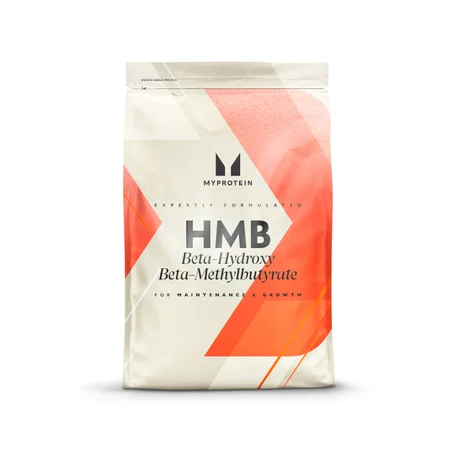What is HMB and what does it do? | Benefits, Uses & Dosage

If you’re new to weight training or trying to change up your routine to boost your results, you might be considering a new supplement routine, too. Here we will discuss HMB, a supplement to complement the more common lean mass boosters like creatine and protein powder, that can even preserve your muscle mass and prevent muscle breakdown.1 HMB might be your missing puzzle piece to faster recovery and seeing greater results.
What is HMB?
Beta-hydroxy-beta-methyl butyrate, or HMB for short, is made in our body from the amino acid leucine. Leucine has been known as a powerful nutritional supplement for increasing strength, muscle, and decreasing body fat.1 Leucine has also used for years to prevent muscle fatigue and soreness, which previously made researchers believe that it was also responsible for slowing breakdown of muscle proteins, or proteolysis.1 However, it’s actually HMB, which comes from leucine, that slows this protein breakdown. The combination of benefits that leucine and HMB provide can make a dramatic difference in your workouts and body composition over time.
Summary

What does HMB do, what are the benefits?
1. Protein Absorption
In short, HMB works in two ways — increasing protein synthesis while decreasing protein breakdown.1 This combined anti-catabolic (anti-muscle protein breakdown) and anabolic (muscle protein building) impact means you build lean mass more efficiently – so, that’s greater gains in muscle and strength.2
While you build muscle and increase your strength, you’ll have greater power and reduced muscle breakdown after exercise with consistent HMB supplementation. As your lean body mass increases from building muscle, you’ll increase your metabolism and will be able to level up your workouts. Studies have shown varying impacts of HMB supplementation based on an individual’s fitness level and type of exercise, so let’s break them down one at a time.
2. Strength
One study compared strength performance results of sedentary, overweight women before and after six weeks of supplementing with HMB. Although there was weight loss and fat loss over the course of the study in the group who took HMB, the significant impact was the improvement in their strength performance after 6 weeks (without following a weight training routine).3 This study proved that HMB can increase muscle strength without exercise, even in overweight, sedentary individuals.3
Those who are new to intense training like weightlifting seem to benefit the most from HMB. Since a new high-intensity exercise routine increases the likelihood of muscle damage that needs repairing, HMB can have a hugely positive effect. It is in this population that several studies saw increases in lean body mass and strength, but this is likely to also be due to the combination of a new training routine with supplementation.1
3. Recovery
Those who are trying to up their strength and work their muscles to hypertrophy (muscle growth) are likely performing intense activities that leads to muscle damage. This type of intense training leads to muscle soreness and longer recovery periods. Experienced athletes following this type of training can use HMB to reduce soreness, damage, and shorten recovery by boosting muscle synthesis and slowing breakdown. HMB enables these types of athletes to train more often and see benefits more quickly.1
4. Aerobic Endurance
A study of a small group of elite male rowers compared the impact of HMB on endurance cardiovascular training. Twelve weeks of HMB supplementation increased the athletes’ VO2 max (aerobic endurance) and decreased their body fat.4 The study also indicated that the HMB supplementation might have a positive impact on peak anaerobic power as well.4
5. Weight Control
The main benefit of HMB it its ability to create a net positive balance of muscle turnover — that’s more muscle building than breakdown.1 For this reason, taking HMB while also cutting calories for weight loss, can help preserve lean body mass while targeting fat mass. This can be useful for people who are trying to lose weight without losing muscle.
Another promising study focused on the change of HMB levels as we age, showing that there’s a general decline in HMB as we age (correlated with losing muscle).5 The study also discovered that individuals with higher levels of HMB had greater muscle mass and greater strength than those with lower levels.5
Overall, the beneficial effects of HMB seem to be tied with intensity of the training and level of the athlete who is taking it. The groups who seem to have the greatest benefits from taking HMB are trained athletes who perform intense, challenging workouts that would otherwise be more damaging to the muscles.6 While there’s evidence of increase in strength in groups who are brand new to resistance training, it may be less effective for the occasional exerciser or someone who doesn’t perform very challenging workouts.7
Summary

How does HMB work?
HMB is produced by our bodies from the amino acid leucine. When present in high enough concentrations, it works by speeding the recovery of muscle after prolonged or intense exercise.1 Many studies also show varying degrees of reduced muscle soreness and faster recovery when taking HMB consistently.
Which foods contain HMB?
Because HMB is a product of leucine, to increase your dietary intake you should focus on foods that are high in leucine. High levels of leucine are typically found in high-protein animal-and plant-based foods.8 Examples include:
- Eggs
- Cheese
- Fish
- Soy Protein Powder
- Spirulina
The greater the amount of leucine in your diet, the more HMB will become available, but only about 5% of leucine is converted to HMB. For this reason, an HMB supplement is the most efficient way to get more in your diet.
Types of HMB Supplements
HMB supplements can be available as powdered or capsule forms. Sometimes the HMB is combined with calcium (HMB-Ca) and other times it’s considered a “free acid”, or HMB-FA.1 Most products on the market as supplements are the HMB-Ca form, but some research shows that the free acid (FA) form works more quickly, and may become a more popular option in the future.1 Sometimes HMB is sold in combination with creatine due to its similar additive effects.
When to take HMB
Several different research studies support the theory that the greatest benefit from supplementing with HMB happens when you consistently supplement with HMB for two weeks before changing or intensifying your training.1
Recommended dosage: 3g of HMB-CA, at least an hour prior to intense exercise Loading dosage: 1g, 3 times a day for two weeks in the run up to a new training routine or level of intensity HMB-FA: 1-2g, 30-60 minutes before exercise
The recommended dosage is 3 grams of HMB-Ca at least one hour before intense exercise, but ideally “loading” with 1g, 3 times a day for two weeks before a change in training routine and intensity.1 The HMB-FA form acts more quickly, so this can be taken in a 1-2g dose between 30 and 60 minutes prior to exercise.1
When taken with carbohydrates or as part of a meal, HMB might take longer to become available for maximum benefit. For this reason, if carbs are taken at the same time, consume your HMB about 2 hours before your training session.1
Take Home Message
HMB is an effective supplement for those who want to speed up their recovery from high-intensity exercise — both weight training and endurance cardio. It helps to boost and preserve muscle mass and strength, and can be useful for weight loss.1,5
There have been no reported side effects and even more benefit when combined with other supplements like creatine. If you’re noticing a longer period of muscle soreness and struggling to get the results you want from your training, try taking HMB and changing up your routine to be more challenging.

Claire is a Registered Dietitian through the Academy of Nutrition and Dietetics and a board-certified Health and Wellness Coach through the International Consortium for Health and Wellness Coaching. She has a Bachelor of Science in Biology and a Master’s degree in Clinical Dietetics and Nutrition from the University of Pittsburgh.
Talking and writing about food and fitness is at the heart of Claire’s ethos as she loves to use her experience to help others meet their health and wellness goals.
Claire is also a certified indoor cycling instructor and loves the mental and physical boost she gets from regular runs and yoga classes. When she’s not keeping fit herself, she’s cheering on her hometown’s sports teams in Pittsburgh, or cooking for her family in the kitchen.
Find out more about Claire’s experience here.
- Wilson, J. M., Fitschen, P. J., Campbell, B., Wilson, G. J., Zanchi, N., Taylor, L., … & Ziegenfuss, T. N. (2013). International society of sports nutrition position stand: beta-hydroxy-beta-methylbutyrate (HMB). Journal of the International Society of Sports Nutrition, 10(1), 6.
- Jówko, E., Ostaszewski, P., Jank, M., Sacharuk, J., Zieniewicz, A., Wilczak, J., & Nissen, S. (2001). Creatine and β-hydroxy-β-methylbutyrate (HMB) additively increase lean body mass and muscle strength during a weight-training program. Nutrition, 17(7-8), 558-566.
- Hashempour, A., Hooshmand, S., Tabesh, M. R., & Alizade, Z. (2019). Effect of 6-week HMB (beta-hydroxy-beta methylbutyrate) Supplementation on Muscle Strength and Body Composition in Sedentary Overweight Women. Obesity Medicine, 100115.
- Durkalec-Michalski, K., & Jeszka, J. (2015). The efficacy of a β-hydroxy-β-methylbutyrate supplementation on physical capacity, body composition and biochemical markers in elite rowers: a randomised, double-blind, placebo-controlled crossover study. Journal of the International Society of Sports Nutrition, 12(1), 31.
- Kuriyan, R., Lokesh, D. P., Selvam, S., Jayakumar, J., Philip, M. G., Shreeram, S., & Kurpad, A. V. (2016). The relationship of endogenous plasma concentrations of β-Hydroxy β-Methyl Butyrate (HMB) to age and total appendicular lean mass in humans. Experimental gerontology, 81, 13-18.
- Wilson, J. M., Lowery, R. P., Joy, J. M., Walters, J. A., Baier, S. M., Fuller, J. C., … & Duncan, N. M. (2013). β-Hydroxy-β-methylbutyrate free acid reduces markers of exercise-induced muscle damage and improves recovery in resistance-trained men. British Journal of Nutrition, 110(3), 538-544.
- Rowlands, D. S., & Thomson, J. S. (2009). Effects of β-hydroxy-β-methylbutyrate supplementation during resistance training on strength, body composition, and muscle damage in trained and untrained young men: A meta-analysis. The Journal of Strength & Conditioning Research, 23(3), 836-846.
- United States Department of Agriculture. Nutrient Lists – Leucine. Retrieved July 17, 2019, from https://ndb.nal.usda.gov/ndb/nutrients/index





